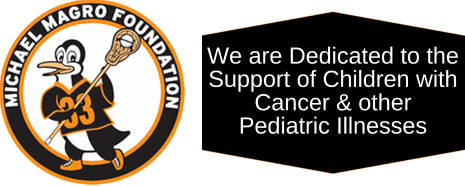SOAR Stewardship 2019-2020
TO: The Michael Magro Foundation
FROM: Brianne Gruber, Kim Krupa, Nancy Morreale, and Dianna Trogel
DATE: November 2020
SUBJECT: SOAR Stewardship 2019-2020
SOAR
Thanks to the enduring support of the Michael Magro Foundation, the NYU Langone Cancer Center for Kids – Mineola SOAR Program continues to meet the critical needs of our school-age patient population. Before a pediatric cancer patient can comfortably return to school, a collaborative effort by the Center’s psychosocial staff, which includes our Psychologist, Social Worker and Child Life Team, in conjunction with school administrative staff and personnel, is integral to a successful outcome. During this unprecedented time, COVID-19 has impacted the academic needs and concerns of the Center’s patient population. However, due to the efforts of a nurturing, professional psychosocial staff, when necessary, parents have been able to establish a routine for their children to study remotely; although less personal contact is a concern, our patients are learning! Now, more than ever, there is a need for our team to connect with the schools regarding our patients’ academic needs, which is done primarily through ongoing phone conferences.
THE PSYCHOLOGIST
According to Dr. Brianne Gruber, despite COVID-19, the Center’s presence in patient and family lives remains essential and steadfast. While supportive counseling has always been a function of Dr. Gruber’s SOAR work, this has become a greater part due to COVID-19. The following patient evaluations represent her figures for completing full evaluations including the testing process, scoring, and analysis of the test protocols, as well as conferences with parents to review test results and impact on the child’s performance in school. The other figures represent in-person meetings with school personnel or the patient’s classmates to provide information about the patient’s school needs prior to the patient’s transition to back to school. These meetings are in conjunction with the entire psychosocial team.
Patient Evaluations – 37
School visit (in-person with school personnel, Child Life Specialist and Social Worker) – 1
Classroom visits (in-person with Child Life Specialist and classmates) – 2
Since July 2019 30 patients have been involved in project SOAR in different ways. Speaking with parents, providing documentation and speaking to the schools.
Seven cases have involved multiple interactions with both the school and parents. These cases were made complicated by both treatment, (sometimes changes in treatment) and COVID 19.
THE SOCIAL WORKER
As the Center’s Social Worker, Nancy Morreale’s duties and responsibilities encompass normalizing academic and tutorial needs for patients, as well as family communications, conference calls, and assistance throughout treatment to ensure that each patient’s needs are being addressed.
Ms. Morreale’s personal relationship with each patient and family addresses a myriad of essential needs.
The impact of COVID-19 has been “tricky,” according to Ms. Morreale, since many schools have altered policies and schedules. For example, advanced planning vis-a-vis ever-changing institutional information and community outbreaks has been extremely difficult for many families.
Ms. Morreale has intensified her work with parents to secure accurate information and enable them to make appropriate decisions for their children, while supporting and promoting school attendance. She notes that “what that has meant this year is quite different and is still evolving.”
Ms. Morreale has shared two examples in order to illuminate SOAR’s vital role in sustaining the health and well-being of the Center’s school-age patient population.
- One patient who was diagnosed during her first college semester had to stop going to school but was able to work with school administrators to complete the semester by finishing her class assignments. Although this appears to be an excellent solution, it caused undue stress for the patient; because of her cancer treatment and hospital admissions, she missed many deadlines; even those which were extended were anxiety-provoking. When she planned, proactively, to take off the following semester, her stress level increased as did her disappointment about “being out of sync” with her peers. Her friends were moving on but she wasn’t; even reconnecting with high school classmates became a challenge. Ms. Morreale shared that her own work with letters and documentation was “the easy part.” Reassuring the patient that life as she once knew it would somehow return was “the hard part.”
- A male patient was having difficulty with online learning. Understanding that this was not a realistic option for him, Ms. Morreale was able to advocate with his school to plan for the days when he wasn’t able to attend class because of medical issues. She was able to create a strategy so that teachers were given advanced notification of his treatment schedules, thereby enabling them to make arrangements for him to keep pace academically and negate the stress he had been experiencing.
The psychosocial team continues to be actively involved in school re-entry and ensuring the success of each child’s transition during and/or after treatment. Even though in-person school visits have not been possible because of COVID-19 concerns, Center staff involvement remains constant and enduring through various interactions as referenced in this report.




